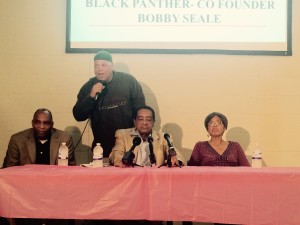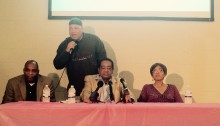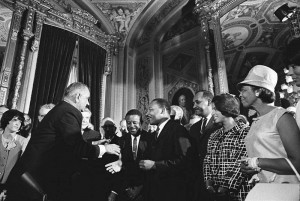
Black leather, big, beautiful, perfectly molded afros and strong Black men and women carrying huge Dirty Harry style guns is the impression that comes to mind when hearing the co- founder of the Black Panther Party is in Houston for the 48th annual anniversary of the organization.
Instead, three members, Co- Founder/Chairman Bobby Seale, Stephen Edwards of the Houston Chapter and Jonina Abron Irvin, the former Editor of the Black Panther Party Newspaper, who looked like normal grandparents sat before the press with bounds and bounds of stories and memories that were as captivating as an story grandma or grandpa could ever tell.
In 1966, Bobby Seale and Huey Newton recognized the disparities in the Black community of Oakland, California and the blatant racism. They grew tired but not weary. Instead of continuing to grumble they put their brains and muscle together to form one of the most influential and memorable organizations in the history of America.
Seale created a 10- point platform on the need for freedom and as a war on poverty. The party was formed on his birthday October 22, 1966. In the mid 60’s the country was amidst turbulent fighting for human civil rights and the anti-Vietnam movement, when a young Black college student with an aerospace engineering job inspired by Dr. Martin Luther King, Jr. quit his job and began organizing for youth jobs in North Richmond.
Soon a small group of men began to meet and to learn the law. Memorizing and understanding the law was the niche that made the Black Panthers so dangerous because they knew what could and couldn’t be done under the law and they could stand on it. They began patrolling the police. They would stand the mandated distance away with their weapons and tape recorders observing their actions.
“The police jumps up to tell us you have no right to observe us and Huey began to state the law. The looked around like what kind of negroes are they,” said Seale?
By Huey Newton, the Minister of Defense, knowing the law, they captured the attention of the police and the people.
“The first year we had 50 members. We had people like Eldridge Cleaver and his wife Kathleen by May of 1967,” said Seale. “In the early days the Black Panthers were for self defense and even women wanted to join and carry guns.”
Seale believed to really create change Blacks had to be elected into “power seats”. In the 60’s when the Black Power phrase was popular there were 50 Blacks in office across America, said Seale. The only way to change the racist laws was to be in some type of position of power to create legislation.
Changing legislation was exactly what happened but not for the party. Politicians began to change the laws where they stopped the Panthers from carrying weapons.
“We were rising up and resisting,” said Seale. “They made the Jim Crow laws and it had to be enforced. Its one thing to holler Black Power this and that but power comes from the ability to make phenomena act is a desired manner. They will kill you and murder you about taking that power.”
The Panthers did amazing work within California that began to spread in Black communities all over the country. The breakfast program started and community support systems were flourishing.
“The reasons schools have free breakfast programs now is because of us,” said Jonina Abron Irvin, Former Editor of the Black Panther Newspaper. “J. Edgar Hoover called the program a threat. He understood the power of feeding hungry children.”
The next phase was to apply the original intent, which was to get the proper legislation passed. They tried to get referendums passed in three cities, Richmond, Oakland and San Francisco. San Francisco was the only city that received enough votes to get the Police Patrol Referendum on the ballot. It allowed for 3-5 community members who were duly elected to review and investigate police complaints.
The party began to dissolve by 1974 and Seale resigned from his seat as chairman. Political organizing mistakes, central community framework and mistakenly breaking down of chapters allowed for the dissolution of the Panthers after close to 10 years of service.
Seale passed down advice to the younger Black community that they should continue to run for political office.
“In 1960 there were 500,000 seats we (Blacks) could be elected to and we only had 50,” said Seale. “We couldn’t vote and it had to be changed and it was the reason we started the Black Panther Party. Now we have the Black Caucus and 42 power seats, we must keep those seat, its power.”
Seale went on to say that people don’t need guns in this day and age. They just need video cameras and an organizing mind and spirit. If the political seats can be gained and the community takes over the local government then a community can gain real control.
The Black Panther Party will celebrate their 48th Anniversary at the Communication Workers of America (CWA) Hall in downtown Houston on Friday, October 24, 2014 at 7:00 pm.


